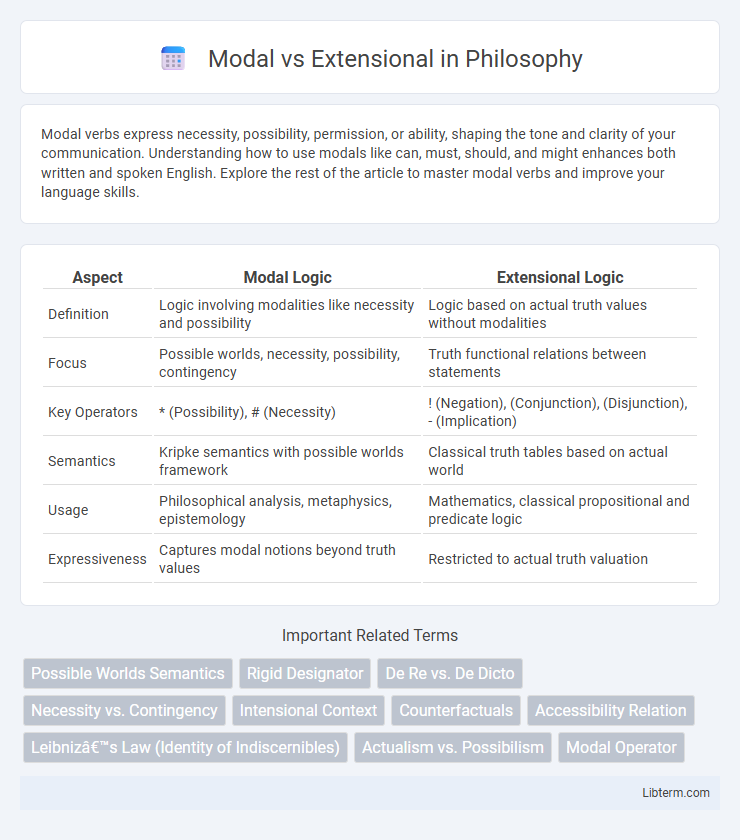Modal verbs express necessity, possibility, permission, or ability, shaping the tone and clarity of your communication. Understanding how to use modals like can, must, should, and might enhances both written and spoken English. Explore the rest of the article to master modal verbs and improve your language skills.
Table of Comparison
| Aspect | Modal Logic | Extensional Logic |
|---|---|---|
| Definition | Logic involving modalities like necessity and possibility | Logic based on actual truth values without modalities |
| Focus | Possible worlds, necessity, possibility, contingency | Truth functional relations between statements |
| Key Operators | * (Possibility), # (Necessity) | ! (Negation), (Conjunction), (Disjunction), - (Implication) |
| Semantics | Kripke semantics with possible worlds framework | Classical truth tables based on actual world |
| Usage | Philosophical analysis, metaphysics, epistemology | Mathematics, classical propositional and predicate logic |
| Expressiveness | Captures modal notions beyond truth values | Restricted to actual truth valuation |
Introduction to Modal and Extensional Logic
Modal logic extends classical logic by incorporating modalities such as necessity and possibility, enabling reasoning about statements concerning what must be true or could be true in different possible worlds. Extensional logic, in contrast, evaluates statements solely based on the actual truth values of their components without considering modality, focusing on concrete set memberships and truth assignments. This distinction underpins applications in philosophy, computer science, and linguistics where modal logic models uncertainty and propositions across potential scenarios.
Defining Modal Logic
Modal logic extends classical logic by incorporating operators expressing necessity and possibility, enabling reasoning about various modes of truth. Unlike extensional logic, which evaluates statements based solely on truth values, modal logic uses possible world semantics to assess how truth can vary across different scenarios. This framework is crucial for fields like philosophy, computer science, and linguistics, where understanding modality enhances analysis of knowledge, beliefs, and obligations.
Understanding Extensional Logic
Extensional logic focuses on the exact objects or elements that satisfy a predicate, emphasizing truth values based on set membership and the actual extension of terms rather than possible scenarios. It operates strictly within the confines of what is true in the actual world, relying on concrete data and clear-cut references to determine validity. This contrasts with modal logic, which incorporates necessity and possibility by considering multiple possible worlds or scenarios beyond the actual extension of terms.
Core Differences Between Modal and Extensional Approaches
Modal approaches prioritize possibility and necessity through possible worlds semantics, emphasizing the variability of truth across different scenarios. Extensional approaches focus on actual truth values and concrete referents within a specific domain, assessing statements based on their direct correspondence to real-world entities. Core differences lie in modal logic's treatment of potentiality versus extensional logic's concern with actuality and truth preservation under strict reference.
Applications of Modal Logic
Modal logic finds extensive applications in computer science, particularly in verifying software and hardware systems through model checking and temporal logic. Its ability to express necessity and possibility supports reasoning about knowledge and belief in artificial intelligence, enhancing decision-making processes. Extensional logic, by contrast, emphasizes truth-functional semantics, making it more suitable for database querying and formal specification where concrete truth values prevail.
Use Cases for Extensional Logic
Extensional logic is primarily used in computer science applications such as database theory, formal verification, and knowledge representation, where precise truth values of statements are necessary. Its focus on the actual extension of predicates enables effective reasoning about concrete objects and their relationships in real-world contexts. Extensional logic supports optimization of query processing and consistency checking by utilizing explicit set membership and object identity.
Syntax and Semantics: Modal vs Extensional
Modal logic employs possible worlds semantics, using modal operators such as * (possibly) and # (necessarily) to extend classical propositional and predicate logic syntax. Extensional logic, rooted in classical logic, interprets expressions based solely on their truth values within a fixed domain, without reference to alternative worlds or states. Syntax in modal logic includes modal operators that transform formulas, while extensional logic syntax relies exclusively on standard logical connectives and quantifiers reflecting actual truth conditions.
Advantages and Limitations of Modal Logic
Modal logic enhances classical logic by incorporating modalities such as necessity and possibility, enabling more nuanced reasoning about knowledge, belief, and obligation. Its advantages include the ability to model dynamic systems, handle propositions across possible worlds, and facilitate formal verification in computer science. However, limitations arise from increased complexity, less intuitive semantics for non-specialists, and challenges in automating modal reasoning compared to extensional logic.
Advantages and Limitations of Extensional Logic
Extensional logic excels in clarity and simplicity by focusing on the truth values of statements without ambiguity stemming from possible worlds or modal contexts. Its advantages include straightforward applicability in classical logic systems and ease of computational implementation in automated reasoning tasks. Limitations arise from its inability to adequately capture necessity, possibility, and other modal nuances essential for reasoning about knowledge, belief, and temporal states.
Choosing Between Modal and Extensional Logic: Key Considerations
Choosing between modal and extensional logic depends on the nature of the concepts being analyzed; modal logic is essential for reasoning about necessity, possibility, and other modalities, while extensional logic focuses on concrete truth values without modality. The decision hinges on whether the context requires handling potentiality, belief, or obligation, which modal logic can capture more effectively. Researchers must evaluate the semantic domains involved and the desired expressiveness to determine the appropriate logical framework.
Modal Infographic

 libterm.com
libterm.com